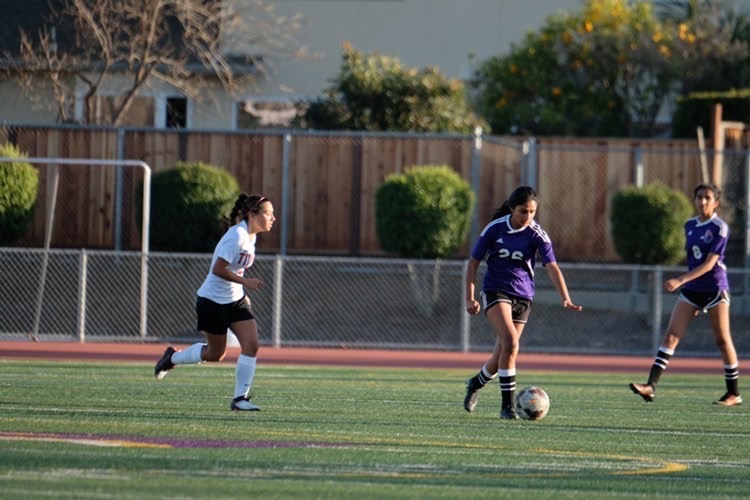Overtraining: How much is too much?
Exploring how overtraining impacts the game and mindset of MVHS athletes
Photo used with permission from Viveka Ramanathan.
Ramanathan kicks the ball at a soccer game.
September 12, 2020
As sweat drips down his forehead, his heart pumps faster and he takes a moment to catch his breath. While running Super 17’s, which consists of running back and forth from sideline to sideline, junior and JV Boys Basketball player Theodore Zhang aims to push himself to his max so he can finish the drill on time. Zhang believes every sport requires high intensity practice in order to improve skills.
“Training is important because if you don’t train your body for the physical parts of the game, your body won’t be able to handle it,” Zhang said. “[If you don’t train properly], you can get hurt badly.”
However, there’s a fine line between training and overtraining. According to Health Line, “overtraining usually occurs when you work out too much without allowing enough recovery time between sessions,” an issue senior and Varsity Girls Soccer player Viveka Ramanathan believes can impact a game.
“I feel like overtraining makes you super burnt out for the game,” Ramanathan said. “At least for a couple of days, I hate playing soccer [after overtraining]. When I do the same thing over and over again like 10 times in a row, I don’t want to redo [the drills] again in the game and then have my coach get mad at me because I did it wrong. I [get] tired of the game itself, because overtraining pretty much is a result of not doing well in the game or not doing well enough in practice.”
Ramanathan points out that when training for a sport, the coach is usually in control. Therefore, she says it is extremely important for the coach to recognize the players abilities and prevent overtraining.
“Your coach wants you to get better, [so] they just push you to overextend yourself day after day,” Ramanathan said. “I don’t think that’s fair and I don’t think that’s very right on the athlete itself because everyone needs a rest day too. I feel like knowing that there is a limit to overtraining your player and that could cause serious consequences either physically or even mentally is a really important step.”
Sports can provide many benefits such as increasing cardiovascular health and muscle endurance, but overtraining can have the opposite effect. According to the Hospital for Special Surgery (HSS), overtraining syndrome can cause problems like unusual muscle soreness, prolonged general fatigue and increased blood pressure. Former Varsity Baseball Coach Robbie Hoffman notices that training for one sport for an extended period of time can cause physical harm.
“One of the bigger problems in terms of overtraining [is] a lot of athletes focus on one single sport and they play it throughout the entire year,” Hoffman said. “Because of that, you start to see a lot of people have physical injuries. In baseball, a lot of individuals throw too much and they [won’t] put the ball down for a while. What ends up happening is they have more problems — their elbow would go out, their shoulder would go out, their ligaments and tendons wouldn’t function properly.”
Health Line recommends that to prevent overtraining, it is best to schedule regular rest days after long or demanding workouts as well as have rest periods during workouts. Since everyone’s bodies and physical capabilities are different, Zhang says he recognizes the importance of focusing on one’s limits.
“I think as a player, most of the time they will say something [about feeling overtrained] and are able to recognize their own personal limits,” Zhang says. “When we lose in an embarrassing way, the coach punish[es] us to run a lot. Some of us can take it [whereas] some of the other players can’t, because they’re either sick or they’re not as strong as the rest of us.”
Ramanathan adds that at times, it may be hard to open up to coaches about overtraining. Consequently, she believes that everyone on the team should have equal responsibility in recognizing their teammates’ abilities, which can help eliminate overtraining in the future.
“I feel like the team [should] talk to each other when someone is really not [feeling well],” Ramanathan says. “It’s also the duty of the captain as well to be able to talk to the coach and tell them that, ‘Hey, there’s several different players that aren’t able to do the same thing over and over again and you’re really hurting them. Maybe it’s time to tone it down or take a break or do something more chill and [relaxed].’ In general, someone needs to step up and talk to the coach when they feel like players are being overtrained.”














